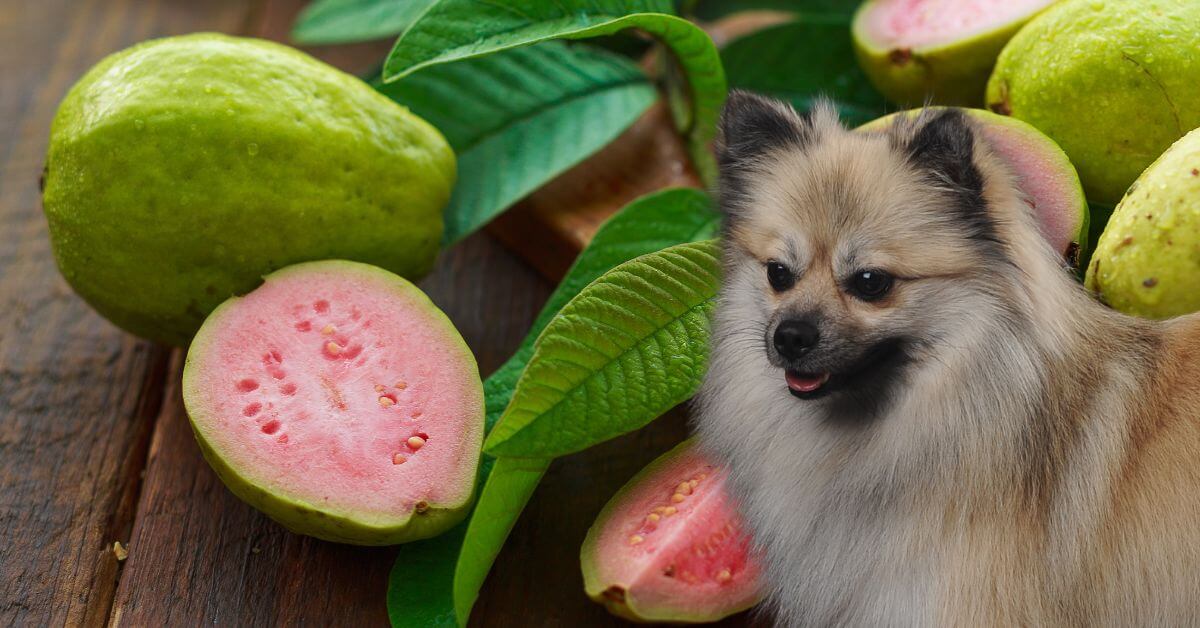Can Dogs Eat Guava?
Yes, dogs can eat guava as long as you give your dog a piece and remove the seeds and the rinds. Rinds can be a choking hazard, and seeds can be toxic in large amounts (so you don’t need to worry!). There are many different types of guavas, and they are all safe for dogs. Guavas are packed with nutritional benefits, and they have vitamins A and C, fiber, and antioxidants, all great stuff for your dog’s immune system and healthy digestion. However, too much guava can lead to an upset stomach, and, well, let’s just say your dog might have a case of the runs! We’ll explore this in more detail.

Guavas are popular in tropical and subtropical regions, especially in countries like India, Mexico, and Thailand. In the United States, guavas are mostly enjoyed fresh, in smoothies, or as a flavor in desserts and drinks. For us, guavas are a rare indulgence, and when we buy them (since they are super expensive), we tend to keep them for ourselves selfishly. But what’s important for dog owners to know is that guavas are not toxic to dogs and are perfectly safe fruits for dogs.
Is guava safe for dogs?
Let’s explore different parts of guava and dig deeper into the unsafe aspects to understand which parts of the fruit are safe for our dogs and which should be avoided.
Guava fruit (flesh)
Yes! This juicy fruit is an excellent treat and it’s aboslutely safe when given in moderation. In case you have a guava tree in your garden, your dog may devour a whole guava with seeds and rinds (and that’s not recommended), but don’t worry, even if that’s the case, your dog will be fine.
Guava fruit is rich in water content, which helps keep your dog hydrated. It has vitamins A and C, fiber, and antioxidants, all good for the immune system and healthy digestion. Guava has natural sugars, but it’s important to note that fructose, the sugar found in fruit, is digested differently than glucose in dogs. While fructose is less likely to spike blood sugar levels, it’s still essential to offer guava sparingly to prevent excessive calorie intake.
Seeds
Guava seeds, on the other hand, are not safe for dogs. They are a choking hazard and are difficult to digest. Additionally, guava seeds contain trace amounts of cyanide, which can be dangerous if consumed in large quantities. If your dog eats guava seeds, they could experience digestive issues or a choking hazard, and in large quantities, the cyanide could be harmful. What are large quantities of cyanide? We are talking about a lot of guavas! It’s more likely that they will overeat and fall asleep than have so many guavas to experience toxicity. But when sharing with your dog, remove the seeds before offering guava to your dog to ensure their safety.
Skin
Guava rinds can be tough to digest, increasing the risk of a choking hazard. If your dog eats guava rinds, they might face digestive problems or choking, as the rinds are tough to digest and can obstruct the airways. Always peel the guava and remove the rind before giving it to your furry friend.
Guava can be a tasty and healthy treat full of good stuff like vitamins, fiber, and antioxidants, but remove the seeds and skin. Just remember to give guava in moderation to avoid any tummy troubles or weight gain. With these simple steps, you can share this delicious tropical fruit with your furry friend without any worries.
Love, life, and fur forever!
FAQs
Can dogs eat guava paste?
It’s best to avoid giving dogs guava paste. Guava paste often contains high amounts of sugar and other additives that aren’t good for dogs.
Can dogs eat guava seeds?
No, dogs should not eat guava seeds. First of all, they can choke and then it’s never a good idea to eat anything with cyanide, even in small amounts. While the amount of cyanide is not typically dangerous in small quantities, consuming large amounts can be harmful.
Can dogs eat guava skin?
It’s better to avoid giving dogs guava skin. The skin is super tough to digest, can hurt their teeth and gums, and may cause choking or digestive issues.
Can dogs eat strawberry guava?
Yes, dogs can eat strawberry guava as long as the seeds and skin are removed. As with regular guava, moderation is key to preventing any digestive issues.